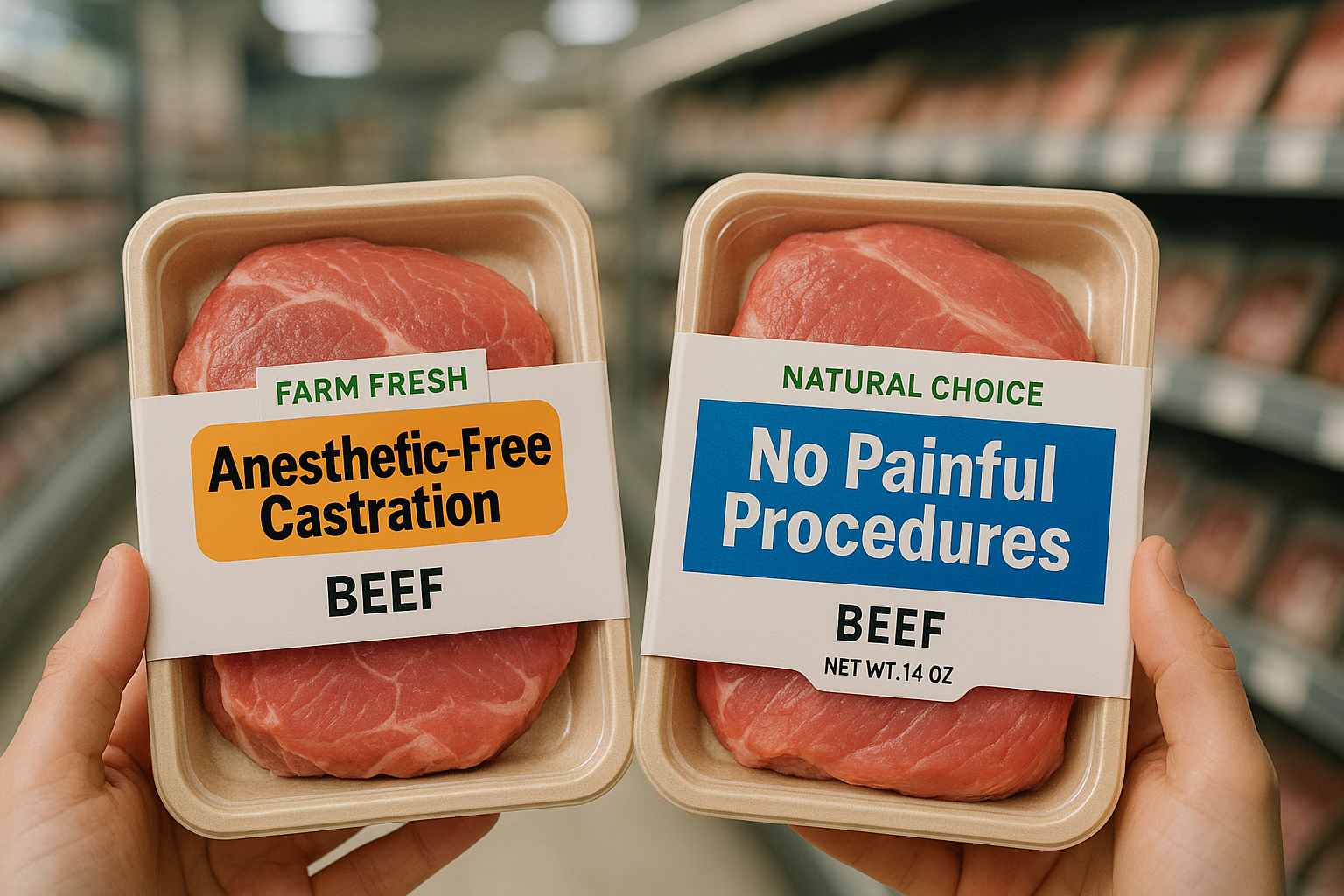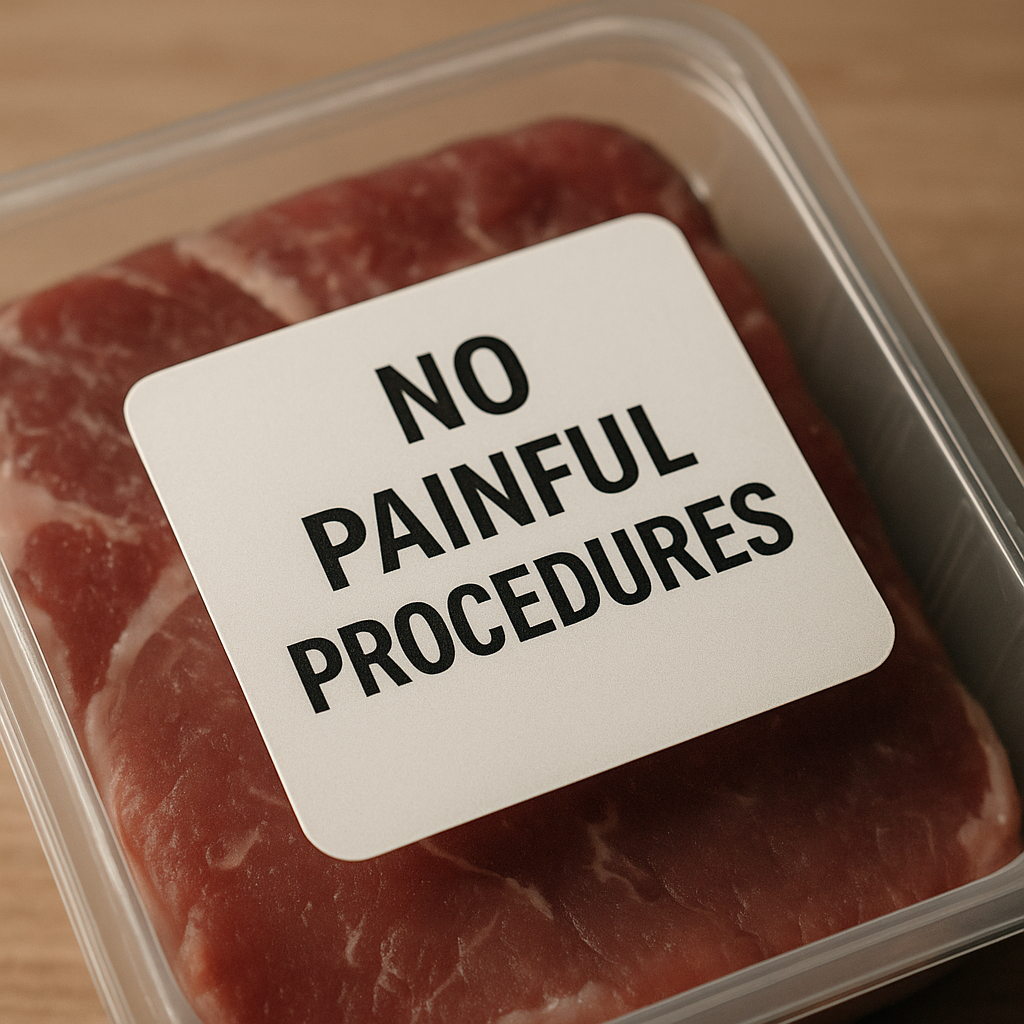Physical Address
304 North Cardinal St.
Dorchester Center, MA 02124
Physical Address
304 North Cardinal St.
Dorchester Center, MA 02124


From removing live frogs’ legs to calf castration, the new laws are designed to provide transparency around painful practices in animal farming.
Switzerland has just become the first country in the world to introduce food labels that tell you how animals were treated. New legislation means that products like meat, milk, eggs, foie gras, and frog legs must carry labels showing whether the animals were subject to “painful procedures” without anesthesia.
The government says the goal is transparency. Supporters say it’s a step in the right direction. Critics say it’s not enough. In this article, we’ll discuss what you need to know about the new laws.
In May 2024, the Swiss government approved a new regulation requiring clear animal welfare disclosures on selected food products. The law takes effect on 1 July 2025, with a two-year transition period for producers and retailers to comply.
The new rules apply to all companies that offer animal-based foods, including small business and restaurants. They cover both domestic and imported products, including:
Under the regulation, labels must indicate if animals were subjected to defined “painful practices”.
The law shifts responsibility to retailers, who must ensure products are labelled accurately at the point of sale. This marks a rare attempt to bring greater visibility to how animal products are made, not just where they come from.
The system was developed by the Federal Food Safety and Veterinary Office (FSVO) and reflects a growing demand among Swiss consumers for greater transparency around farming practices.
But some campaigners argue the law doesn’t go nearly far enough, and may even give factory farming a cleaner image than it deserves.
Switzerland’s new animal welfare food labelling laws didn’t appear out of nowhere. It’s the result of years of public pressure, political debate, and a growing demand for transparency in the food system.
Animal protection has a long history in Swiss law. The country banned battery cages in 1992 and has some of the strictest farm animal regulations in Europe. But campaigners have long pointed to a glaring loophole: imported goods.
Even as Swiss farms phase out some of the worst practices, the same cruelty often comes in through the back door. For example, force-fed foie gras, frog legs from dismembered amphibians, and eggs from battery hens are not produced in Switzerland. But all of it is freely sold. That contradiction has sparked outrage from animal welfare groups and confusion among consumers.
This new law is meant to close that gap. For the first time, both Swiss and imported products will be required to reveal whether animals were subjected to certain painful procedures.
The framework was developed by the Federal Food Safety and Veterinary Office (FSVO), the agency behind the move. According to official communications, the goal is to give consumers the tools to make informed choices, especially when products come from outside Switzerland’s regulatory reach.
But there’s also political context. In May 2024, the Swiss Federal Council approved the law amid rising momentum for animal welfare reform. A growing number of voters, especially younger generations, want more accountability in the food system. This label may be an attempt to show action without introducing bans.
Critics argue it’s a compromise measure: a way to maintain trade relationships while still appearing to champion animal protection.
But it remains to be seen whether Switzerland’s new animal welfare food labelling laws are a stepping stone toward stronger reforms or a PR shield against them.

Switzerland’s new animal welfare food labelling laws require labels to show whether animals were subjected to procedures, without anaesthetic or pain-relief, that are officially recognised as painful under Swiss animal welfare law:
These aren’t fringe cases. They’re standard industry procedures throughout the EU and beyond, just often invisible to shoppers.
Despite its headline appeal, Switzerland’s new animal welfare food labelling laws only cover a small slice of the animal farming process. They focuses solely on whether animals were subjected to a short list of predefined painful procedures.
Unfortunately, it leaves out many of the most routine (and arguably more harmful) aspects of animal farming:
In other words, a product might carry a label stating it involved “no painful procedures”, but still come from an animal who lived a short, confined, and stressful life before enduring a painful and terrifying slaughter.
This is where the biggest criticism comes in. By shining a spotlight on just a few practices, Switzerland’s new animal welfare food labelling laws risk giving the impression that the rest of the process is acceptable.
You might assume that if something isn’t labelled as cruel, it must be fine. But in reality, it’s not so clear-cut.

Some campaigners argue Switzerland’s new animal welfare food labelling laws do more to protect public perception than protect animals.
By highlighting only a narrow range of procedures—and only when done without anaesthetic—the law risks oversimplifying animal welfare.
It frames the issue around pain relief, rather than questioning the practices themselves. So, procedures like dehorning, beak trimming, tail docking, or castration are implied to be acceptable, as long as anaesthetic is used
That sends a powerful message: these acts are only unethical if they’re painful in the moment. The longer-term stress, fear, confinement, and suffering that animals endure throughout their lives go unacknowledged.
There’s also concern that the labels may lull consumers into a false sense of morality. If a pack of eggs or a piece of meat doesn’t carry the “painful procedure” label, it might appear more ethical, even if the farming system behind it was still intensive, confined, and far from humane. This kind of welfare-washing can create the illusion of progress, while shielding the status quo from deeper scrutiny.
Animal advocates also warn about desensitisation. The more often consumers see labels admitting to painful procedures, the more normalised those words become.
What happens when “castration without anaesthetic” or “force-feeding” becomes just another label like “contains milk” or “keep refrigerated”?
The question is not just whether consumers are informed, but what they’re being encouraged to accept.
Switzerland’s new animal welfare food labelling laws could push other countries to follow suit. But the question is whether it will lead to meaningful change or just better marketing.
At the EU level, there is no welfare labelling system for animal-based food products yet. However, some countries like Germany, Denmark and the UK have devised their own systems.
The issue is that farms with “high-welfare” labels (like RSPA-Assured and Red Tractor) have been exposed time and time again for housing animals in horrific conditions and subjecting them to terrible abuse.
Perhaps the question shouldn’t be “how much cruelty is acceptable?” but “is it ever acceptable at all?”
On the same day Switzerland’s new animal welfare food labelling laws were announced, the government also approved a ban on fur imports linked to cruel practices. From July 2025, companies won’t be allowed to import fur from animals who were trapped, force-fed, or caged for life.
It’s a clear sign that the Swiss government is trying to clean up its animal welfare image. But past efforts haven’t always worked. A similar labelling rule was introduced for fur products back in 2014, but recent investigations by authorities found faulty labelling in approximately 60% of outlets.
That raises a fair question: if sellers couldn’t follow the rules for fur, how will this new labelling system for food be enforced?
In May 2025, just weeks before Switzerland’s new animal welfare food labelling laws were approved, the country’s Federal Supreme Court made a different kind of decision that raised a few eyebrows among food policy watchers.
It ruled that plant-based products can no longer use terms like “vegan chicken”, “plant-based pork”, or “meat-free sausage” on packaging.
Why?
According to the court, such wording “constitutes deception,” because it could mislead consumers into thinking the product contains animal meat.
The irony hasn’t gone unnoticed.
While the government is pushing for more transparency around how animals are treated in the food system, it’s also limiting how clearly plant-based alternatives can label themselves. For many consumers trying to make more ethical or sustainable choices, these labels act as useful guides. They explain what the food replaces in simple, recognisable terms. Removing them may create more confusion.
On the other hand, meat packaging often features idyllic farm scenes, despite coming from industrial systems. Yet that’s rarely challenged.
Critics argue this is a double standard that benefits the animal agriculture industry while making life harder for the plant-based sector. As Switzerland positions itself as a leader in food transparency, the tension between these two rulings reflects a deeper cultural divide. They seem to protect the meat and dairy industry more than they protect consumers.
Switzerland’s new animal welfare food labelling laws are being hailed as a world first. They aim to bring long-hidden farming practices into the light. That kind of honesty is rare in the meat industry.
But labels alone don’t change the system. They don’t improve conditions for animals, or prevent cruel practices from happening.
They only tell part of the story. The labels don’t cover how animals live, how they’re transported, or how they’re slaughtered. And it doesn’t address the broader question: are we comfortable with these practices at all?
For now, the labels may help consumers make more informed choices. But they also risk oversimplifying a complex issue of why we still treat sentient beings as products.
Foodstuffs without the labels may get a more ethical image than they deserve. Consumers may be fooled into feeling like they’re making better choices, when in fact they’re still supporting the practices they oppose.
Ultimately, whether this is the beginning of real reform, or just a rebranding exercise, depends on what comes next.